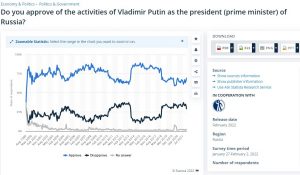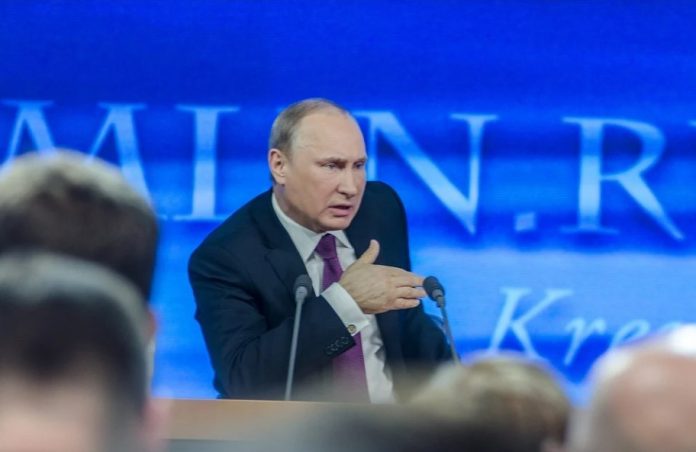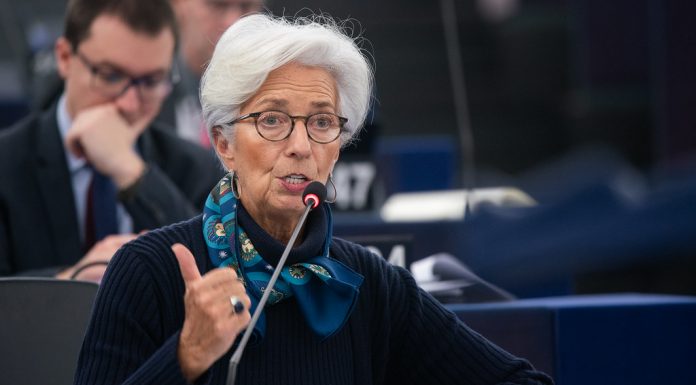Following Russia unilaterally declaring two breakaway regions in eastern Ukraine as no longer be part of Ukraine and the entry of Russian troops onto Ukraine’s internationally recognized territory, the German government decided to suspend the Nord Stream 2 gas pipeline, a new and controversial natural gas connector between Russia and Germany. The pipeline would double the capacity of the existing Nord Stream capacity for gas exports, something which would make Europe too energy-dependent on Russia, according to the United States. U.S. President Trump even imposed sanctions on anyone involved in Nord Stream 2, a policy which was ended by current U.S. President Joe Biden in May 2021. The construction of the new pipeline was completed in September 2021 but still needed approval from Germany’s regulator.
Hereunder, I make the case why suspending Nord Stream 2 is the right thing to do.
1- It was always a deeply crony project anyway
Nord Stream 2 has been presented as a purely economic project, but that is simply not the case. For a start, its most important owner is Russian state-owned company Gazprom, while Nord Stream 2’s German ceo, Matthias Warnig, is a former Stasi agent and an old friend of Putin, who was posted in East Germany in his KGB days.
In 2005, Gazprom shareholder Bill Browder, Russia’s first shareholder-activist, alleged waste and abuse at the company, where Russian President Vladimir Putin had installed his associate Alexei Miller, who’s still in charge of it. In response, Browder was detained at the airport and sent back on a plane to London, with his visa revoked. Many of Browder’s his assets in Russia were expropriated in all-but-name. One of his lawyers, Sergei Magnitsky, who refused to leave Russia, ended up in prison, where he has beaten to death, In his honour, laws imposing asset freezes and travel bans on Russia regime members have been dubbed “Magnitsky”-sanctions.
One could argue it is fine to do business with foreign companies that are run in a dodgy way, as otherwise, we’d need to shut down a lot of trade, but the cronyism involving the Nord Stream 2 project is not limited to the involvement of a state company from an authoritarian-led impoverished country in the European periphery.
Also the German government has been deeply involved in Nord Stream 2, as it provided a 1 billion euro guarantee for the project, at the time the biggest ever by the German government, which otherwise rarely provides risk coverage to foreign companies. The guarantee was agreed by the government of social democrat Chancellor Gerhard Schröder on 24 October 2005, one month after he lost an election and just before he accepted a 250,000 euro-a-year job from Gazprom. Unbelievably, Schröder denied to be even aware of the decision to grant the guarantee. Despite the European Commission barking a bit over “illegal state aid”, which it indeed was, Angela Merkel’s government simply continued with the state guarantee loans for Gazprom, which in 2010 already amounted to 3.1 billion euro.
The cronyism is really all over the place. In January 2021, the government of Mecklenburg-Vorpommern, the east German region where Nord Stream 2 makes landfall, even set up a state-backed foundation to help avoid U.S. sanctions against Nord Stream 2. The supposed “climate” foundation for example owns a ship that is engaged in pipe-laying activities.
Cronyism is part and parcel of the energy sector, unfortunately, but clearly, the hands of both the Russian and German state are to be found throughout Nord Stream 2, which can therefore not be seen as some kind of private sector venture that would purely respond to private sector incentives. In the past, Russia hasn’t exactly shied away from shutting off gas supplies for political reasons, so this risk needs to be taken on board when assessing the project.
2- Germany’s craving for Russian gas is closely interlinked with its failed climate policies
Fundamentally, there are only three reliable sources of energy: gas, coal and nuclear energy. Renewable energy technologies, like solar and wind power generation, are great and can make the West less energy-dependent from authoritarian neighbours, but they are deeply unreliable, given how they depend on the sun shining and the wind blowing. This downside is not yet something that can be compensated with battery technology, while also hoping for hydrogen as a solution is unrealistic.
Given that Germany has decided to shut down both nuclear energy generation as well as coal plants, there is only gas left to save the day. In effect, since the so-called German “Energiewende”, German dependence on Russian gas has only increased and is expected to further increase. 40 percent of gas imports into Europe derive from Russia, but for Germany, this is more.
In sum, Germany’s energy-dependence on Russia is not the outcome of some natural economic process, but results from deliberate top-down economic planning in favour of renewable energy sources, despite the fact that these are not trustworthy. Favoring renewables while banning nuclear and coal therefore equals imposing gas as the dominant energy source. Suspending an extra gas pipeline that consolidates such a policy may therefore force Germany to reflect more fundamentally about its energy choices.
"Germany needs to stop imposing its failed energy policies on the rest of the EU"
New article by @pietercleppe:https://t.co/OVPtpHe1ng #Germany @OlafScholz #Energiewende #EU #taxonomy #stateaid @vestager #EU @emmanuelmacron #NuclearPower— BrusselsReport.EU (@brussels_report) January 4, 2022
3-Suspending Nord Stream 2 may force Germany to rethink its exit from nuclear power
The German government considers its reliance on gas as a transitional measure, awaiting the development of wind and solar energy into trustworthy energy sources. To be frank, this is simply laughable. Despite years of subsidies, wind and solar energy still only account for less than 10 percent of global energy production.
Germany is planning to turn off its last three nuclear power plants – Isar 2, Emsland and Neckarwestheim II – by the end of 2022. In Belgium, a similar nuclear exit may now be under threat as the result of Russia’s actions, even if the governing greens still need to be convinced. If they do, Germany’s governing greens may follow the example of their Belgian allies. It is noteworthy that the greens in Finland, which more than any other country knows how to deal with Russia – by maintaining a strong military and building nuclear plants – are supportive of nuclear energy, which has a very low CO2 footprint.
Also the fact that Japan has decided to reactivate its nuclear power plants can serve as an interesting precedent.
Another upside of reactivating the older nuclear plants is that the cost of dismantling them, which amounts to billions and will be due at one point, no matter what happens, can be shifted into the future.
This is all a no-brainer really. Therefore, Germany’s energy debate may get very interesting.
In 🇩🇪, hugely important decisions often came as reversals (social reform by socialist, open borders by conservative, nuclear exit by scientist Chancellor).
Now that the SPD Chancellor put NS2 on hold, Green Econ Minister will have to announce not closing remaining ☢️ plants. pic.twitter.com/d0MbgH2Yes
— VKJudit (@VKJudit) February 22, 2022
If only Germany already had a dispatchable, clean, zero-carbon energy source that isn't piped from thousands of kilometers away at the whims of a war-mongering autocrat. ⚛️ Hard nut to crack, this one! @simonfriederich https://t.co/wJTSfPdUMk pic.twitter.com/VIseavm9hD
— Maarten Boudry (@mboudry) February 22, 2022
4-It should not have a big effect on current energy prices
Despite predictions that suspending Nord Stream 2 would have a very big price effect, it is very tricky to make any grand statements on energy prices. This is notoriously complex, perhaps even more so than for other prices, given the big influence of both governments and geopolitics on energy prices. Then it is a fact that Nord Stream 2 has not been activated yet, so supposedly the short term effects cannot be too big.
All things remaining equal, the lack of Nord Stream 2 may indeed mean higher energy prices over the longer term, but this could be compensated by a German decision to restart its nuclear plants or build new, more modern, nuclear plants.
German Chancellor Olaf Scholz has issued an order to halt the process of certifying the Nord Stream 2 gas pipeline. Well. Welcome to the brave new world where Europeans are very soon going to pay €2.000 for 1.000 cubic meters of natural gas!
— Dmitry Medvedev (@MedvedevRussiaE) February 22, 2022
5-Even if the West cannot defend Ukraine, it should not help Russia crack down on it
Dealing with Russian aggression has never been an easy challenge and always involved a healthy dose of realpolitik. Even during the cold war, political tensions did not undermine energy trade. Then, it is one thing to cut off existing energy trade with Russia, which would clearly be a bad idea, and yet another to artificially boost it, which is what Nord Stream 2does.
Nord Stream 2 is closely related to the bedrock of the Russian regime: income from commodities, facilitating the concentration of power and money in the hands of the few, making them less dependent on public opinion and more prone to foreign military adventures and imperialism.
The benefit of merely suspending Nord Stream 2 is that it is not final. At one point, when Russia would behave again, it can be reactivated.
Ukraine is not a member of NATO, and there is a good reason for that: there is no democratic support within NATO to allow Ukraine in. That’s because of two main reasons. First of all, Ukraine isn’t sufficiently Western, with its oligarchs, curtailing of press freedom and high levels of corruption. Secondly, of course more importantly, as the first argument also applies to certain NATO member states, is that, rightly or wrongly, Russia does not consider Ukraine to be a proper country.
Realpolitik is a part of life and there is nothing wrong with applying it here. Everyone wishes Ukraine well, but that doesn’t mean people in NATO countries would be willing to die for it.
To impose “Magnitsky”-style sanctions on Russian lawmakers and regime affiliates of all stripes possibly makes sense as well, but it is way more tricky. If Western governments would, for example, start expropriating assets owned by those deemed to be close to the Russian leadership, as some suggest, there may be no end to it.
.@EmmanuelMacron is seeking in Moscow and Kyiv solutions to the European security crisis triggered by Putin. I suggest Mr.Macron to try to find a solution also in France. I will help – this thread will be about french assets of Russian oligarchs. How about freezing them? 👇
— Daria Kaleniuk (@dkaleniuk) February 8, 2022
Who to include, and what will judges say when only some weak link with Putin is presented as justification for expropriating an expensive villa in France or an investment fund in London? What if Western governments get a taste of it and start applying this method domestically?
In the first place, “Magnitsky”-style sanctions have really been applied for about a decade now, and the actual results haven’t been great. At least they didn’t do as much damage as regular economic sanctions, which tend to always hurt the population and strengthen the regime, as it helps them to get people to rally around the flag.
Conclusion
For now, Putin has secured a number of important wins.
First of all, he has expanded Russia’s military presence into Belarus indefinitely, meaning that Poland’s border with Russia now not only consists of its border with the Russian enclave Kaliningrad but of the whole Polish-Belarussian border, so the Russian army now has a direct land connection between Russia and Poland.
— Pieter Cleppe (@pietercleppe) February 19, 2022
Secondly, Putin has managed to destabilise Ukraine. How does Putin profit from this? A reformed and successful Ukraine may well be the most significant threat to the stability of his regime, as it could be seen as a template to follow, given the cultural similarities between the two countries.
Thirdly, Putin is likely to enjoy another bump in popularity polls. In 2021, his popularity was at the lowest levels since 2013, just before Russia grabbed Crimea. What better than poking up some foreign tension to boost one’s popularity?

Last but not least, Putin has now also gained ground in Eastern Ukraine, as Russian troops have entered the two breakaway regions. It remains to be seen whether the regular Russian military now engages in the war to gain the part of those regions that are still in the hands of Ukraine or that Russia may even go further and for example take the strategically important port city of Odessa, home to many Russian speakers and a bridge to the Russian-controlled enclave of Transnistria in Moldova.
Whether one thinks Putin needs to be stopped now, before he attacks NATO member states, or whether one thinks this really has nothing to do with NATO and the EU, it is clear that the West should no longer engage in the kinds of cronyism that breeds Russian authoritarian behaviour in the first place, and for that, there is no better place to start than with suspending Nord Stream 2.













